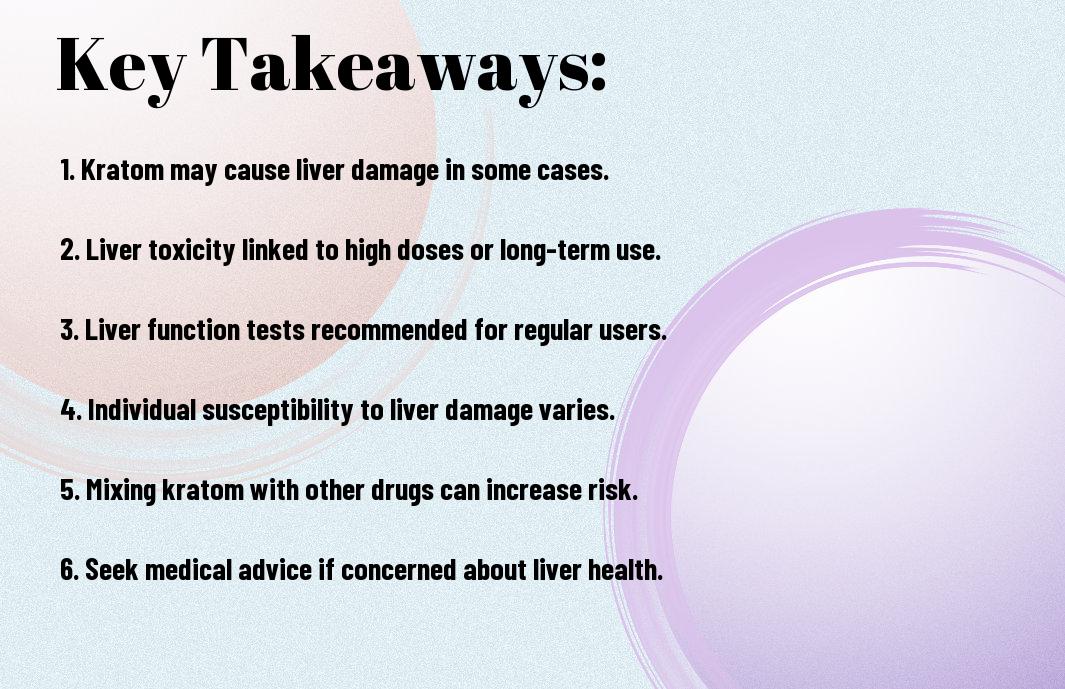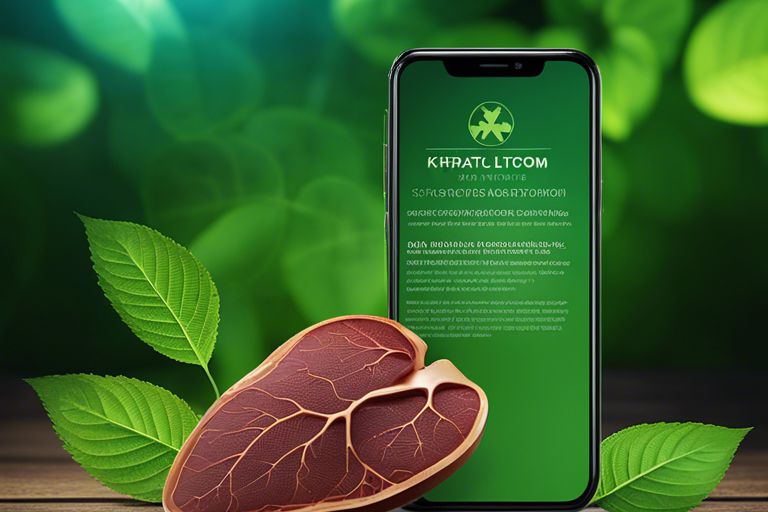Many factors can impact the health of your liver, including the consumption of substances like kratom. According to a recent study discussed in Kratom Safe? Study Links to Liver Health Issues, it is important to understand how kratom affects your liver to make informed choices about its use.

Kratom Basics
What is Kratom?
The use of kratom, also known by its scientific name Mitragyna speciosa, has gained popularity in recent years. Kratom is a tropical tree native to Southeast Asia, particularly Thailand, Malaysia, and Indonesia. Its leaves contain compounds that have psychotropic effects when consumed. In traditional practices, kratom has been used for its stimulant and pain-relieving properties.
History of Kratom Use
An understanding of the history of kratom use can provide insight into its traditional and contemporary significance. Kratom has been used for centuries by indigenous communities in Southeast Asia for its medicinal and recreational purposes. The plant’s psychoactive effects have been utilized in various cultural practices and rituals. However, the recent increase in global consumption has raised concerns about its safety and regulatory status.
A closer look at the history of kratom use reveals a complex interplay between cultural traditions, pharmacological effects, and regulatory challenges. As you explore into the world of kratom, it is crucial to consider the diverse perspectives surrounding its use and potential impact on health and well-being.

Liver Function and Health
Overview of Liver Function
If you are wondering about the role of your liver in your body, you’re not alone. The liver is a vital organ responsible for numerous functions. It helps in detoxifying harmful substances, metabolizing drugs and nutrients, storing vitamins and minerals, and producing proteins necessary for blood clotting. Your liver also plays a crucial role in regulating cholesterol levels and breaking down old or damaged blood cells.
Common Liver Problems
To understand how kratom may affect your liver, it’s important to grasp the common liver problems that can arise. Hepatitis, fatty liver disease, and cirrhosis are some prevalent conditions that can impact liver health. Hepatitis refers to inflammation of the liver and can be caused by viruses, excessive alcohol consumption, or autoimmune diseases. Fatty liver disease occurs when fat accumulates in the liver, often due to obesity or high alcohol intake. Cirrhosis is a severe condition where liver tissue is replaced by scar tissue, usually as a result of long-term liver damage.
This knowledge of common liver problems will help you recognize potential warning signs and take necessary steps to protect your liver health. If you experience symptoms such as abdominal pain, fatigue, jaundice, or unexplained weight loss, it’s crucial to consult a healthcare professional for proper evaluation and management.
Kratom’s Impact on Liver Enzymes
Keep in mind that kratom can have various effects on liver enzymes, which play a crucial role in metabolizing drugs and toxins in your body. Understanding how kratom interacts with liver enzymes is imperative for assessing its overall impact on your health.
Cytochrome P450 and Kratom
Kratoms have been found to affect the activity of Cytochrome P450 enzymes in your liver. These enzymes are responsible for metabolizing a wide range of medications and substances, including kratom itself. When kratom alters the activity of Cytochrome P450 enzymes, it can influence the metabolism of other drugs you may be taking, leading to potential drug interactions.
Inhibition of Liver Enzymes
Enzymes present in your liver are imperative for breaking down substances like kratom. However, kratom has been shown to inhibit certain liver enzymes, potentially impacting the way your body processes not only kratom but also other compounds. This inhibition can affect the efficiency of drug metabolism, leading to prolonged effects of certain substances in your system.
With the inhibition of liver enzymes by kratom, it is important to be cautious when combining kratom with other medications or substances. This interaction could alter the effectiveness and safety of the drugs you are taking, emphasizing the importance of consulting with a healthcare professional before using kratom, especially if you are on other medications.
Acute Kratom Toxicity
All the effects of kratom on the liver are not always positive. When consumed in excessive amounts, kratom can lead to acute toxicity. This can result in a range of symptoms and may require emergency medical attention.
Symptoms of Kratom Overdose
One of the key aspects of acute kratom toxicity is the manifestation of overdose symptoms. These can include nausea, vomiting, dizziness, increased heart rate, high blood pressure, and agitation. In severe cases, respiratory depression and seizures may also occur. If you experience any of these symptoms after consuming kratom, it is important to seek immediate medical help.
Treatment of Kratom Overdose
Toxicity resulting from a kratom overdose can be managed through supportive care. This may involve monitoring vital signs, administering intravenous fluids, and providing respiratory support if needed. In cases of severe toxicity, antidotes or medications to counteract the effects of kratom may also be administered. It is crucial to seek professional medical assistance if you suspect you may be experiencing kratom overdose.
Acute kratom toxicity is a serious condition that requires prompt medical attention. It is vital to be aware of the potential symptoms of overdose and seek help immediately if you or someone you know experiences any negative effects after consuming kratom.
Chronic Kratom Use and Liver Damage
Long-term Effects on Liver Health
For individuals who consume kratom regularly over a prolonged period, there is a concern about the long-term effects on liver health. Any substance that is processed by the liver, such as kratom, has the potential to cause damage if used excessively or for an extended duration.
In some cases, chronic kratom use may lead to liver inflammation, known as hepatitis. This condition can result in symptoms such as jaundice, fatigue, and abdominal pain. It is necessary to monitor your liver function through regular check-ups if you are using kratom on a long-term basis.
Increased Risk of Liver Disease
Long-term kratom use has been associated with an increased risk of liver disease. Research has shown that prolonged exposure to high doses of kratom can strain the liver and interfere with its normal functioning. This can ultimately lead to more severe conditions such as liver cirrhosis or even liver failure.
With your health in mind, it is crucial to be aware of the potential risks of using kratom regularly and to consult with a healthcare professional if you have any concerns about your liver health.
Interactions with Medications and Liver Health
Not all substances react well together, especially when it comes to the delicate balance of liver health. It’s crucial to consider the effects of kratom on your liver, particularly when combined with other medications or supplements.
Prescription Medications
Prescription medications have specific instructions to follow for a reason – they interact with your body in very particular ways. When adding kratom into the mix, it’s important to be cautious. Some medications are metabolized in the liver, and there may be potential for interactions between the drug and kratom, affecting how they each work in your body. Always consult with a healthcare provider before combining kratom with any prescription medications.
Kratom and Herbal Supplements
One important thing to keep in mind is that herbal supplements can also have an impact on liver health. Certain herbs may have their own liver effects, and combining them with kratom could potentially put extra strain on your liver. This is why it’s vital to understand how different substances may interact when taken together.
With all this in mind, it’s vital to approach the use of kratom with caution, especially if you are taking prescription medications or other herbal supplements that could affect liver health. Your liver plays a crucial role in metabolizing substances in your body, so being aware of potential interactions is key to maintaining your overall well-being.
To wrap up
Ultimately, it is crucial to be aware of the potential effects that kratom can have on your liver. While not everyone may experience liver problems from using kratom, it is imperative to monitor your liver function if you choose to consume this herbal supplement regularly. Understanding the risks and being proactive about your health can help ensure that you make informed decisions about using kratom.
FAQ
Q: Can kratom usage have effects on the liver?
A: Yes, prolonged and heavy kratom usage may lead to potential liver damage.
Q: What are some symptoms of liver issues related to kratom use?
A: Symptoms may include dark urine, yellowing of the skin or eyes, fatigue, and abdominal pain.
Q: How does kratom affect the liver?
A: Kratom contains compounds that may be metabolized by the liver, potentially causing strain or damage over time.
Q: Are there any studies confirming kratom’s impact on the liver?
A: There are limited studies on this topic, but some research suggests a possible link between kratom use and liver toxicity.
Q: Can liver damage from kratom be reversible?
A: In some cases, if the liver damage is caught early and kratom use is discontinued, the liver may heal and recover.
Q: How can one minimize the risk of liver damage from kratom?
A: To reduce the risk, it is recommended to use kratom in moderation, stay hydrated, and avoid mixing it with other substances that may harm the liver.
Q: Should individuals with pre-existing liver conditions avoid kratom?
A: Yes, individuals with liver problems or conditions should consult with a healthcare professional before using kratom to assess the risks and potential impact on the liver.









